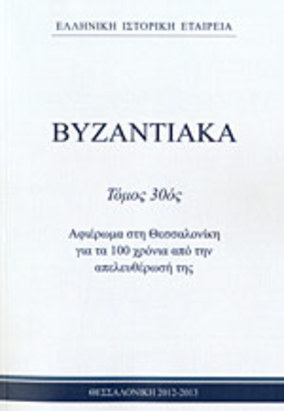Το Έδικτον της Αβύδου : σχόλια και επισημάνσεις για τη χρονολόγηση και το περιεχόμενό του
Part of : Βυζαντιακά ; No.29, 2010, pages 49-74
Issue:
Pages:
49-74
Parallel Title:
The Edict of Abydos : comments and remarks on the chronology and content
Section Title:
Συνεργασίες
Author:
Abstract:
The ports of Abydos in the Hellespont and of Hieron in the Bosphorus defined the special status and the «economic frontiers» of the wider region of the byzantine capital, Constantinople, at least from the 6th century onwards. Many researchers believe that the so-called «Edict of Abydos» may be used as a primary source of information for the beginning of the operation of the customs station at Abydos (under the super vision of a comes ) during the early Byzantine period. The creation of the latter, in mid-sixth century, is described by Procopius (John Malalas mentions only the comes of Hieron). According to some modern historians, the Edict comes from the first years of the reign of Justinian I (527-565). In our opinion, it is more likely that it was published during the reign of Anastasius I (491-518) and probably not related to the operation of the subsequent local customs station and the imposition of trade tariffs. The Edict mentions only some specific goods (foods). It also determines the rather small amounts (sportulae) that should be paid by the carriers ναύκληροι) of wheat (for the so-called anno na civica) and someother basic foodstuffs to the then auditors (κλασσικοί) of the Straits, with no particular fiscal purpose.lt seems though that this situation changed during the reign of Justinian I, who established local public customs stations to Abydos and Hieron led by high-ranking officials. These officials (comités ) also bore high senatorial titles and received salaries from the State {μισθοφόροι άρχοντες). They were obliged to ensure the greatest possible revenue from tax collection for the benefit of the State. This explains why Agathias calls the customs station of Abydos as a «δεκατευτήριον» (i.e. a place where a tax of 10% ad valorum was paid).
Subject:
Subject (LC):
Notes:
Περιέχει σημειώσεις και παράρτημα, Η συγκεκριμένη μελέτη βασίζεται σε τμήμα της προφορικής μου ανακοίνωσης υπό τον τίτλο «Η βυζαντινή Άβυδος και η διοικητική οργάνωση των Στενών του Ελλησπόντου», Ελληνική Ιστορική Εταιρεία. ΛΒ' Πανελλήνιο Ιστορικό Συνέδριο, 27-29 Μαΐου 2011 Θεσσαλονίκη (Φιλοσοφική Σχολή ΑΠΘ).




